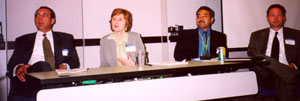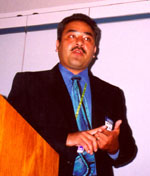MPC's July transit and technology roundtable looked at how technologies will integrate the Chicago region's transit, improving it for riders.
From online fare card deposits to real time bus stop arrival signs, technology integration will define the future of transportation in the Chicago region.
That was the main message transportation experts delivered to MPC's Wednesday, July 11 "Transit and Technology: Getting around in the future" roundtable discussion.

Representatives of the Chicago Transit Authority (CTA), the Chicago Department of Transportation (CDOT) and the Regional Transportation Authority (RTA) presented the cutting-edge plans their agencies are developing.
"The key for the RTA...is integration of technologies," said John DeLaurentiis, deputy executive director of planning for the RTA.
This would include electronic kiosks, traffic signal priority technology for buses and regional fare cards that can be used interchangeably on Metra, CTA and other mass transit.
CTA representative Luis Cantu detailed the success of the city's "smart card" pilot program, which sold 3,500 renewable and replaceable plastic "touch and go" CTA cards last year.

He said CTA would start selling another 300,000 cards in February 2002. In the future, he said, customers will be able add value to their cards through the Internet and use them like bank ATM cards to pay taxi fares and make other transit-related transactions.
Cheri Heramb, deputy commissioner of CDOT, said two-thirds of the CTA's one million daily trips are aboard buses, and presented six soon-to-be-available bus models that will be more efficient in terms of emissions, customer boarding, sound and size.
The buses will be "new, cleaner, brighter and more fun to ride on," Heramb said. They range in capacity, price and power source, from $270,000 for the 80-person diesel powered Nova bus to $1.2 million for the 120-person diesel-electric hybrid vehicle.
Some audience members asked about stricter noise and emissions technologies than the experts said are currently available. However, Jay Stitely, of the American Foundation for the Blind, said quieter buses might make travel more difficult for blind people who rely on the distinctive sound of bus engines to alert visually impaired riders to the bus' arrival.
Heramb said bus stops with electronic arrival announcements would be one way to address Stitely's concern. She said CDOT's other plans included canopies at bus stops and the building of a busway alongside Metra's south suburban electric rail lines that will connect McCormick Place to Randolph Street and the downtown hotel district.
The city has purchased about 200 Nova buses and will buy another 250 Nova buses over the next four years, said CTA Vice President of technology management John T. Flynn, and it will begin buying 200 larger accordion-style buses next year.
For more information on transit technologies, contact
MPC Transportation Associate Natashia Holmes at 312/863-6022.